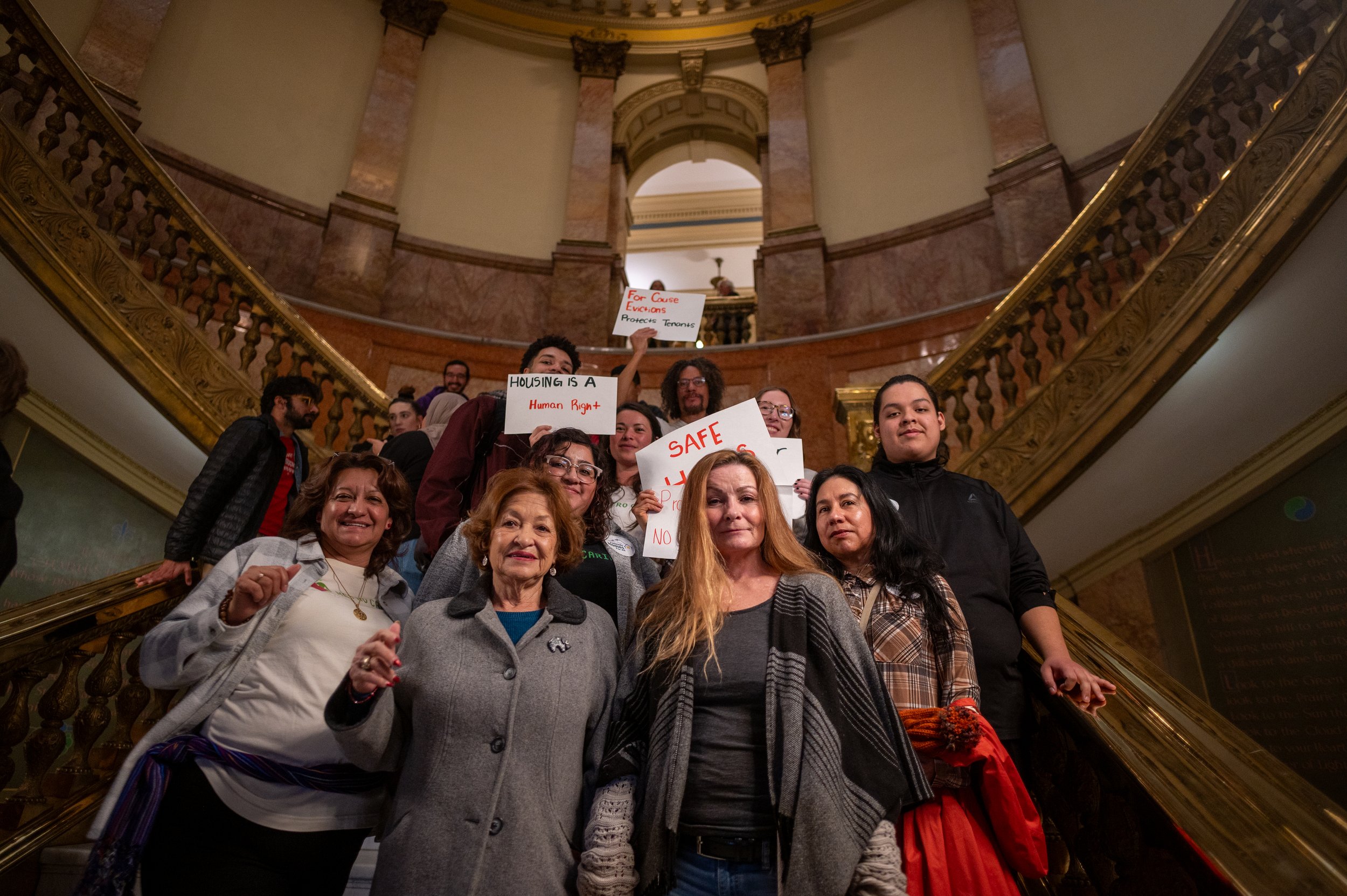Coloradans do not go hungry because of a lack of food. Coloradans go hungry because rent continues to rise while wages lag behind, because SNAP benefits are difficult to get, and because healthcare is out of reach and expensive.
Addressing these root causes is critical to achieving Metro Caring’s mission of ending hunger. One of the ways we can is by supporting community leaders who want to fight for better policies in our state government. Our Community Organizing team rallies leaders to occupy all areas of influence in our anti-hunger movement. We want to shift power to the people who are most impacted by inequity in the existing food system.
Last year, we launched our Organizing Committee with nine community members who help set our policy priorities. The Organizing Committee hosted over 50 people at five “house parties,” where each committee member invited people from their families, neighborhoods, and communities to discuss challenges that lead to hunger. They also identified hopes and dreams for a brighter future.
Cinthya Garcia hosted one of the house parties. She said the events taught her about the importance of working together across differences.
“The House Party taught me that as individuals we tend to only think about what affects us, but if we talk to other people, we realize that what affects some of us, affects us all, even if it is in different ways,” Garcia said in Spanish. “If we improve a condition for one group, we all improve.”
From these house parties, our community identified five issue areas that are most important to focus on to end hunger:
- Food access
- Housing
- Public benefit reform
- Health
- Thriving wage
This year’s legislative session is scheduled from January 10 until May 8. During this time, legislators convene at the Colorado State Capitol to pass new laws and budgets for the year. We identified nine bills and issues that Metro Caring will advocate for during the 2024 session to advance our community’s priorities. Our Organizing Committee members will be testifying at hearings, organizing their friends and neighbors, and communicating with elected officials.
“Participating in the legislative session is our chance to take action on the root causes of hunger,” says Brizai Gomez Cortes, Metro Caring’s Lead Organizer. “As an organization focused on food justice, it’s imperative that we’re at the table, pushing for policies that dismantle barriers to food access and address the underlying issues driving hunger in our community.”
You can help by writing and calling your state elected officials at key moments in a bill’s progress to become law. To know when it’s time to act, subscribe to our Action Alert emails or follow us on social media.

Brizai Gomez Cortes is Metro Caring's Lead Organizer
Read on to learn about our legislative priorities for the year and the impact each could make if passed.
Metro Caring 2024 State Legislative Priorities
Healthy Food Incentive Funding
Issue Area: FOOD ACCESS
The Healthy Food Incentive Funding improves access to fresh Colorado-grown fruits and vegetables through two programs:
The Colorado Nutrition Incentive Program (CNIP) provides produce boxes to low-income seniors.
Double-Up Food Bucks gives SNAP recipients twice the amount of benefits when they purchase Colorado-grown produce at participating farms, markets, or retailers.
The Healthy Food Incentive Funding would improve nutrition for low-income communities while investing in Colorado farmers and our local food system.
SNAP Outreach Funding
Issue Areas: PUBLIC BENEFIT REFORM, FOOD ACCESS
SNAP Outreach is a federally matched program that improves equitable access to the Supplemental Nutrition Assistance Program through education and application assistance. This program ensures low-income eligible households receive vital food assistance, leading to improved health outcomes, economic resilience, and a significant return of investment into the Colorado economy.
SNAP Outreach has partnered with more than 50 community-based organizations, like Metro Caring, to make SNAP enrollment easier by countering misinformation, stigma, language barriers, and digital access. The SNAP Outreach program has helped nearly 40,000 Colorado families and households apply for SNAP benefits in 2023, bringing in more than $68 million in federal grocery money and generating more than $102 million in economic activity for the state of Colorado. Adequately funding SNAP Outreach is an investment in the long-term prosperity of our economy and the well-being of all Coloradans.
Strengthen the Colorado Necessary Documents Program
Issue Area: PUBLIC BENEFIT REFORM
Identification documents such as a driver’s license or birth certificates are essential for people to stay and get employed, open a bank account, access healthcare, receive housing, and apply for public benefits.
But the fees to get these documents can be challenging for people who have lost documents due to natural disaster, domestic violence victims who had to leave their documents behind when fleeing form home, and people experiencing homelessness whose documents may have been stolen or displaced.
Colorado’s ID project pays for vouchers so people can receive free identification documents. Metro Caring is one of the partner organizations that give out these vouchers. This bill would move the physical ID vouchers currently being distributed by partner organizations like Metro Caring to an online format, which would help us with out-of-pocket costs and improve the rate of vouchers that are used.
Time to Eat Task Force
Issue Areas: FOOD ACCESS, HEALTH
This bill would establish a time-to-eat task force in the Department of Education to make sure public schools are giving their students enough time during lunch period.
Children need access to healthy school meals for their development and academic success. Colorado voters previously invested in students by establishing the Healthy Schools Meals for All program in 2022, which ensures all students have access to healthy school lunches. School meals help promote learning, provide students with daily nutrients, and, for many students, reduce the impacts of food insecurity. Without adequate time to eat meals, students’ concentration and behavior is negatively impacted, and the meals they are given are likely to be thrown out. The Time to Eat Task Force would allow adequate time for students in Colorado public schools to eat a healthy and nutritious meal during their lunch period.
Agricultural Workforce and Suicide Prevention
Issue Areas: HEALTH, FOOD ACCESS
Agricultural workers are the backbone of Colorado’s food industry. Many of the restaurants, grocery stores, and anti-hunger organizations rely on Colorado’s agricultural workforce. But agricultural workers have a hard time receiving proper mental and physical care. In Colorado, farmers, ranchers, and farm workers are twice as likely to die from suicide compared to the statewide average.
This bill would create a program to provide agriculture workers with mental health support, suicide prevention services, and crisis management services. If this legislation were approved by the Colorado State Legislature, it would mean that agricultural workers would have increased access to mental health resources in rural areas in order to decrease the rates of suicide among the agricultural workforces.
Defendant Filing Fees in Evictions
Issue Area: HOUSING
Colorado renters are paying the price for the current housing crisis. Eviction filings in Colorado have increased 45% in the last year with a total of 12,910 filings in 2023. When a landlord files to evict a tenant, the tenant is allowed to respond with an “answer” to explain their perspective on the matter or to dispute the claim of a lease violation. Tenants are under pressure to “answer” in a timely manner, which can be difficult when someone is experiencing financial burden. Through this bill, if a tenant is required to mail their “answer,” the court can mail the document on their behalf without charging any fee or cost related to the mailing.
If this legislation is to pass, it will remove the burden of cost for a tenant when a landlord files for an eviction, allowing them to more quickly respond to their landlords claim.
Cause Required for Eviction of a Residential Tenant
Issue Area: HOUSING
Under current law, Colorado renters do not have any written protections from unjust evictions or retaliations from their landlords. This creates an unsafe and uncomfortable environment for renters across the state. In the past year, there have been 35,000 eviction filings in Colorado.
The Cause Required for Eviction bill would give Colorado renters extra protections from unlawful and unjust evictions as well as protection from a landlord’s retaliation. The Cause Required for Eviction bill would require landlords have a reasonable cause, which could include non-payment of rent, substantial violation to the lease agreement, if there are repeat violation after proper notice has been given, and others.
If the Cause Required for Evictions legislation passes, it would help to protect renters from being evicted for arbitrary reasons and hold landlords accountable for unjust evictions and eviction filings.
Bilingual Childcare Licensing Resource
Issue Area: THRIVING WAGE
In Colorado, 231,993 children under six years old have both parents in the workforce and need childcare. However, we only have enough licensed childcare providers for less than 7% of these children.
This bill would provide the childcare licensing requirements and resources in a potential provider’s prevalent language. It would affirm the vital role of a culturally and linguistically diverse childcare provider population and expand available childcare to address the multifaceted needs of Colorado’s diverse communities.
Prohibit Residential Occupancy Limits
Issue Area: HOUSING
Colorado is currently experiencing an affordable housing crisis and municipal residential occupancy limits are hurting Colorado’s renters. In Denver County, there are only 29 available units for every 100 extremely low-income households.
This bill would prohibit the local government from enforcing residential occupancy limits unless the limits are necessary for safety, health, and welfare specifications. Reducing the occupancy limit restrictions improves access to affordable housing options across the state of Colorado.
By passing this legislation and removing occupancy limits, it would help increase access to affordable housing and enhance economic activity for the state of Colorado, reduce housing discrimination, encourage more efficient use of housing and housing resources, and mitigate loneliness and social isolation.




